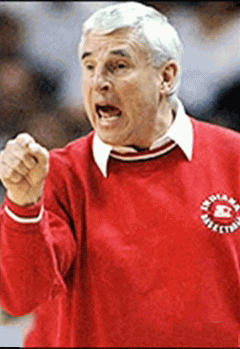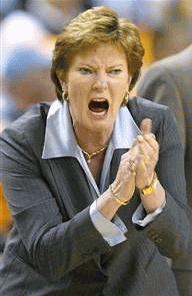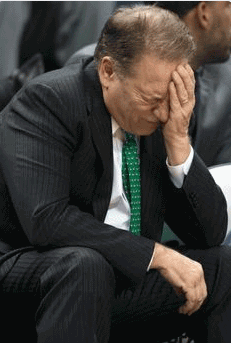Basketball Coaching – Seven Major Reasons Why Games Are Lost
By Dr. James Gels, From the Coach’s Clipboard Basketball Playbook"Helping coaches coach better..."
Disclosure: This page contains affiliate links, which means that Coach's Clipboard receives a small commission (at no cost to you) if you make a purchase using these links.
"Most games are lost, not won." - Casey Stengel
"In order to win, you must first eliminate the things that go into losing." - Bob Knight
In this article, I'm talking about what actually happens during a game. So let's dismiss lack of preparation and other outside factors, even though these may be very important in winning or losing the game at hand. And let's also put aside the obvious here, that your opponent is simply much better than you. Here we are discussing two fairly evenly matched teams, either of which could win the game.
In a nutshell, here are seven main reasons why games are lost:
- Bad Shots
- Turnovers - Bad Decisions
- Lack of Defensive Pressure, Lack of Hustle
- Not Blocking Out, Not Rebounding
- Not Getting Back Defensively
- Stupid Fouls
- Failure to Play as a Team
Bad Shot Selection
Get a good shot every possession. Taking bad shots kills your offense... see "Taking Good Shots - Shot Selection" for more discussion.Turnovers - Bad Decisions
On offense, every possession must be valued. The goal of every possession is to get at least one good shot (and maybe more if we attack the offensive boards). But at least one good shot (or two free-throws) each trip up the court. Notice that I did not say that we will score each time, because that is unrealistic. But we must value each possession, protect the ball, and get a good shot... each trip.Various violations (traveling, 3-seconds, illegal screen, etc.) and bad passing get in the way of achieving this goal. Making bad decisions with the ball leads to turnovers and bad passes... e.g. dribble-penetration into two or three defenders, forcing a bad pass into the defense, etc.
Have you ever watched an NBA or college game where a team fails to score for a long time? Usually it's not because of just poor shooting. It's turnovers, poor offensive execution, and poor shot selection. So get a good shot each possession! Also see "Reducing Turnovers".

Lack of Defensive Pressure, Lack of Hustle
Tough defense and rebounding will win most close games. I saw a high school team win a state championship a few years ago mainly by their great rebounding and defense. They could score too, but were only a little above average on offense.As stated above, on offense we want a good shot every possession. On defense, we want to contest every shot and pressure the ball. Keep the ball out of the paint. Force a bad shot, bad pass or a turnover... and then get the rebound. It's one shot (contested) and OUT!
Great defense will win those games when your offense is struggling. And you can play great defense every game. No player should ever rest on defense. If you need to rest, rest on offense... or on the bench. Poor defense, giving up easy shots, failing to hustle after loose balls are major causes of losing games.

Not Blocking Out, Not Rebounding
To reiterate... tough defense and rebounding will win most close games for you. It's one contested shot and OUT! No second and third shots. If you fail to block out and rebound, and you give up extra shots, your chances of winning are greatly diminished.When you are on defense, you must have that mentality of wanting to get the ball back. As soon as the shot goes up, go get it! Everyone blocks out and rebounds.
Failure to block out also results in more fouls. The offense gets the rebound and we foul on the put-back attempt. In my experience, if you lose the rebounding war, you will probably lose the game.
Can little guys out-rebound a bigger team? It's hard, but if everyone is aggressive in boxing-out their man away from the hoop, it can frustrate the opponent. Instead of working to get around your box-out, they may start pushing in the back or going over the top, which may get their "bigs" in foul trouble. Boxing-out is a foot war... quickness counts.
Not Getting Back Defensively
Failure to sprint back on defense, i.e. poor defensive transition, results in easy shots and lay-ups for the opponent. Sometimes players don't sprint back because they are tired. Take a time-out, or rest the player(s) on the bench for a couple minutes. Amazingly, sometimes players think they are sprinting back, and then we show the game film the next day, and they realize that they weren't.A key here is the first two or three steps. Often a player will see that the opponent has gotten the rebound, will hesitate for a second or two, and then decide to run back, often too late. Players must learn to immediately recognize the change of possession and make those first few steps quickly. Many coaches teach players to run back to the paint, with one player stopping the ball, and the other four players getting one foot in the paint, and then fanning out to pick up the ball or their man from there.
We have a rule on sprinting back. Whenever the ball is even or ahead of you going up the floor, you had better be in an all-out sprint to catch up, or we'll assume that you are tired and need a rest on the bench! But what if my best player is not getting back? Well, he may not really be your best player, or he's tired and needs a rest. Great players want to win and compete on both ends of the court.

Stupid Fouls
There are good fouls and bad fouls. Fouls in the back-court (i.e. in a press defense), or 80 feet from the basket (i.e. fouling the rebounder) are stupid fouls. The game (and the clock) stops. If in the double-bonus, we walk down the floor and they shoot two uncontested free-throws. You may have to do this late in a game if you are behind, but otherwise, these are dumb fouls.Fouling a 3-point shot is a no-no. Fouling the jump shooter is usually a bad foul. Get a hand up, but don't foul, and block-out. Reach-in fouls on the perimeter are not good fouls. Instead players should learn to move their feet and get help from teammates on dribble-penetration.
A good foul may be fouling a lay-up or an inside, high percentage shot. These shots must be contested, and occasionally you'll get a foul, but that's just the way it is. We don't intentionally foul in this situation, and never want our player to take a "cheap shot" at an opponent going in for a score, but we do want to contest that shot.
Bad fouls early in a game get your players in foul trouble, and then they have to sit. Late in a close game, as your team's foul total builds up, the opponent gets to go the free-throw line and score easy free-throws without taking any time off the clock. See: How to Defend Without Fouling
Failure to Play as a Team
A team with twelve or fifteen players playing hard together is a tough team to beat. If one or two players are just playing for themselves and their own stats, many of the above-mentioned factors come into play. Bad, forced shots are taken. Attitudes develop and players stop hustling and working hard on defense.Your "star" players may not sprint back and may loaf on defense. Selfishness results in poor passing and cutting. Players may get angry when taken out the game by the coach. A negative attitude develops on the bench and players are not pulling for and helping each other. Coaches start yelling at their players, and the refs.
Your "star" players must realize that when the all-conference honors and awards go out at the end of the season, most of those awards go to players on winning teams, not just good individual players... another way of selling the "team" concept.



